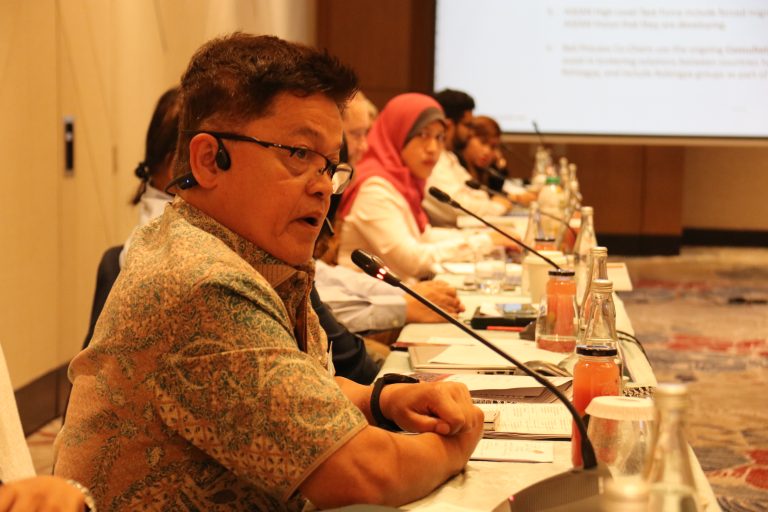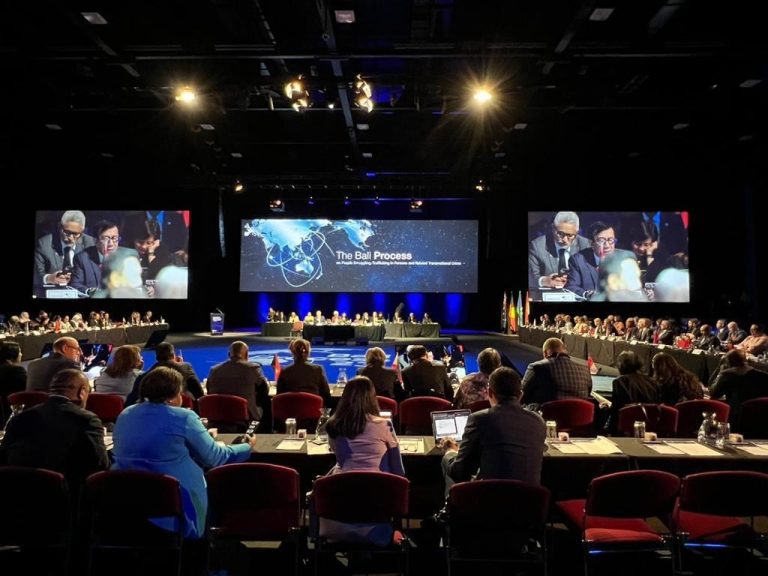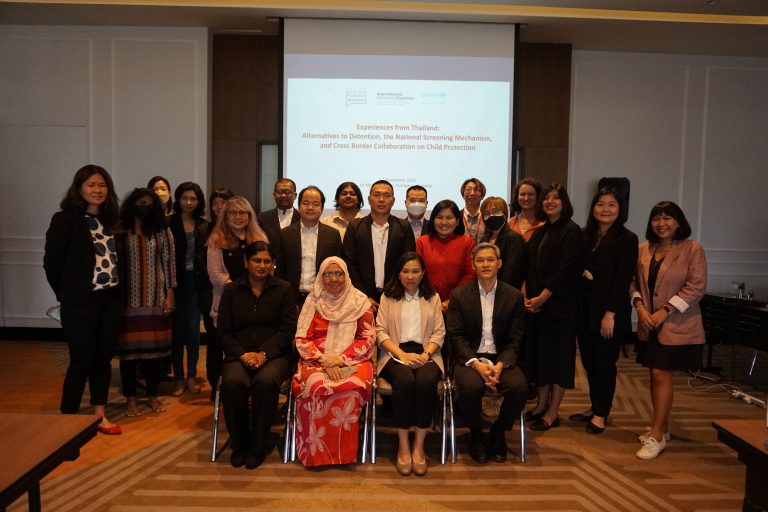The fourth Asia Dialogue on Forced Migration meeting took place in March 2017. Download key documents below and read on for more about the meeting, including photos.
Key documents for the fourth ADFM meeting:
Further information:
- For the ADFM home page click here.
- To find out more about the rationale behind the ADFM click here.
- To read more about the first ADFM meeting in Melbourne in August 2015 click here.
- To read more about the second ADFM meeting in Bangkok in January 2016 click here.
- To read more about the third ADFM meeting in Kuala Lumpur in September 2016 click here.
The fourth meeting of the Asia Dialogue on Forced Migration (ADFM) was held in Jakarta on 5-7 March 2017.
The ADFM meeting was hosted by the Research Centre for Politics, Indonesian Institute of Sciences (LIPI) with support from the Ministry of Foreign Affairs Indonesia.
The ADFM expanded its membership, deepened its policy contributions to the Bali Process on People Smuggling, Trafficking in Persons and Related Transnational Crime (Bali Process) and developed its connection to the Association of South East Asian Nations (ASEAN) at its meeting in Jakarta. We again demonstrated the great value of regularly bringing together experts from across the region to take stock, share information and compare ideas on forced migration.
We successfully reached out to a broader set of stakeholders and enjoyed strengthened participation from regional governments. New members joining the discussions in their personal capacities included Leocadio Trovela (Philippines Senior Representative, ASEAN Senior Officials Meeting on Transnational Crime), Ashraf Haidari (Director General of Policy and Strategy, Ministry of Foreign Affairs Afghanistan), Patawee Treekarunasawad (Counselor and Chief of the Humanitarian Section, Social Division, Ministry of Foreign Affairs Thailand), Chomboon Phansrisak (Plan and Policy Analyst, Office of the National Security Council Thailand) and Wanchai Roujanavoung (Senior Consultant Prosecutor, Office of the Attorney-General Thailand).

Non-government and private sector representation was also strong, with new participants from the University of Dhaka, Bangladesh, The Star, Malaysia, Corrs Chambers Westgarth and Qantas. Chris Evans, former Australian Senator now working with the Global Freedom Network, also joined us to discuss private sector action on forced migration issues.
At the ADFM Dinner, kindly hosted by the Ministry of Foreign Affairs Indonesia, Former Foreign Ministers Hassan Wirajuda of Indonesia and Stephen Smith of Australia advised the group on the strategic questions facing the region and the importance of second track diplomacy.
Discussion and resolutions
The strong momentum of the ADFM continues with members accomplishing significant outcomes together in Jakarta.
The ADFM accepted the Bali Process’s request to provide ongoing policy advice to its member countries. Ministers and senior officials are building the capability of the Bali Process to lead and stimulate real improvement in the region’s responses to forced migration. ADFM members are grateful to be able to contribute to that evolution and are proposing to focus in the first instance on further developing the emergency response mechanism for mass displacement.
The ADFM’s central theme in Jakarta was trafficking in persons, forced labour and slavery, which continue to be a major challenge for the region and acutely relevant to the movement of vulnerable people. Despite significant gains in the national and regional policy and legal frameworks, progress in prevention, protection and prosecution is slow and uneven, with only a small fraction of victims being identified and assisted. ADFM members considered two case studies – the Benjina case of trafficked fishermen and the case of Bangladeshi trafficking victims from areas affected by climate change. Together, these exemplify emerging patterns and challenges in trafficking, forced labour and slavery in the Asia-Pacific.

More public attention, resources and political focus are now directed to these issues than ever before and there are consequently new opportunities for engagement and change. ADFM members offered to act as a knowledge partner to the newly announced Bali Process Government and Business Forum – which will bring together government and business leaders to discuss responses to trafficking, forced labour and slavery within business operations and supply chains – and recommended key priorities for the forum to focus on.
We agreed recommendations to the ASEAN Senior Officials Meeting on Transnational Crime (SOMTC) to advance the implementation of the ASEAN Convention Against Trafficking in Persons, Especially Women and Children (ACTIP). The ADFM are ready to work with ASEAN to strengthen the implementation mechanism, cross-sectoral collaboration and the sharing of good practices.
Members enjoyed a frank exchange on the evolving global and regional context of forced migration. We explored developments since the Refugee and Migration Summits in New York in September 2016, as well as the implications for the Asia-Pacific region of the hardening positions of the U.S. and Europe on forced migration issues.
ADFM members agreed that there was clear opportunity for the ADFM to contribute to the negotiation of the Global Compacts on migration and refugees. The region’s focus could be on sharing what we have learned about managing forced migration issues and advocating for approaches that will be workable for our region. Useful contributions may be on: the development of migration governance and coordination; responses to trafficking in persons; labour migration and mobility; and safe, orderly and legal migration pathways.
We agreed a tight set of forward priorities, including continuing and new initiatives. The ADFM will next meet in September 2017 and March 2018.




